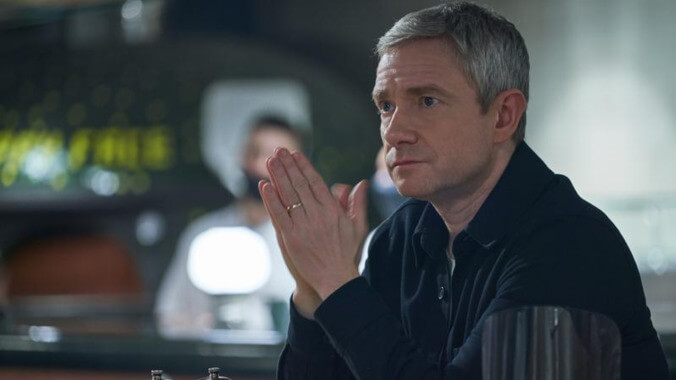This time around, though, his on-screen character is learning to control his anger issues by going to therapy and taking a calmer approach—not just while dealing with the growing pains of his children, but also of his own parents. “I suppose Paul is just better at it by now, he’s had those five more years. He is still essentially the same person but I see him as a demonstrably loving parent. He’s never had any problems telling his kids he loves them, or to kiss or hug them,” Freeman shares. “But he’s also a shouter and has a problem with patience. I’m glad you get to see him interact more with little people who are more able to communicate now.”
As seen in the first four episodes of Breeders season two, those little people are going through their own coming-of-age problems that impact them and their parents’ relationship. Luke, now a teenager, doesn’t know how to face a friendless school life and the anxiety stemming from it, while Ava is already wise for her age, as seen in almost all of her interactions. “That’s what happens when your kids get older, you realize you’re having full-blown conversations with them as real people who are alarmingly like adults,” Freeman says. While the duo could quickly scream or curse at their offspring for creating chaos in the past, the children growing up means they have to handle them differently. It leads to their own maturity in many ways, and both Freeman and Haggard astutely handle their performances to reflect that.
Paul and Ally face a lot of specific, fun situations and hardships, but the series always finds a way to make them resonate. Breeders humanizes and lends empathy toward parental figures. Paul often seeks guidance from his mom and dad, Jackie (Joanna Bacon) and Jim (Alun Armstrong), who regale him with stories of his own childhood to compare with his own habits as a father. Ally, meanwhile, encourages her mother Leah’s (Stella Gonet) romantic adventures this season after losing her estranged father Michael (Michael McKean) in season one. This intergenerational dynamic comes into play a lot more in season two and adds to Breeders relatability. “We think about our upbringing a lot, in the ways it shaped us, the way your parents shaped you,” Freeman says. “A lot of people are not parents but everyone has been a child and most people will remember, if they choose to, the hard and the great bits with their parents.”
Freeman adds that Breeders is identifiable to even those in the audiences who, if they aren’t raising children themselves, know of others who are or know a couple going through similar conditions of juggling work, financial management, and kids. “Also if you have no interest in being a parent or having more kids, it speaks to you,” he adds, which could very well pertain to the cliffhanger of the recent episode. At the end of “No Faith,” Ally thinks she might be pregnant again. It launches a pragmatic narrative for the rest of the season that tests Paul and Ally’s connection as each of them reflect on their lives (with flashbacks) since they had Luke and Ava.
Despite touching on serious issues, Breeders doesn’t lose sight of its humor, interweaving it throughout the episodes via matter-of-fact, deadpan delivery of one-liners and absurd scenarios, like Paul dealing with Jackie and Jim’s twentysomething neighbors, or Ally’s failed attempts to go vegan with her son. Freeman says his real-life kids, whom he often jokes are now demanding royalties for their role in inspiring the comedy, love the show. “They look at me sideways every single time my character does something they recognize,” he admits. It’s the simple but blunt portrayal of regular families that connects with all viewers. “The whole point of this show is that if people are being honest, there will be something that is very easily relatable about it. It’s not the Instagram version of parenting,” he adds. “I was going to say it’s old-fashioned, but actually it’s a style that is alive and kicking today. It is how families function in many ways.”





















![Rob Reiner's son booked for murder amid homicide investigation [Updated]](https://img.pastemagazine.com/wp-content/avuploads/2025/12/15131025/MixCollage-15-Dec-2025-01-10-PM-9121.jpg)




















